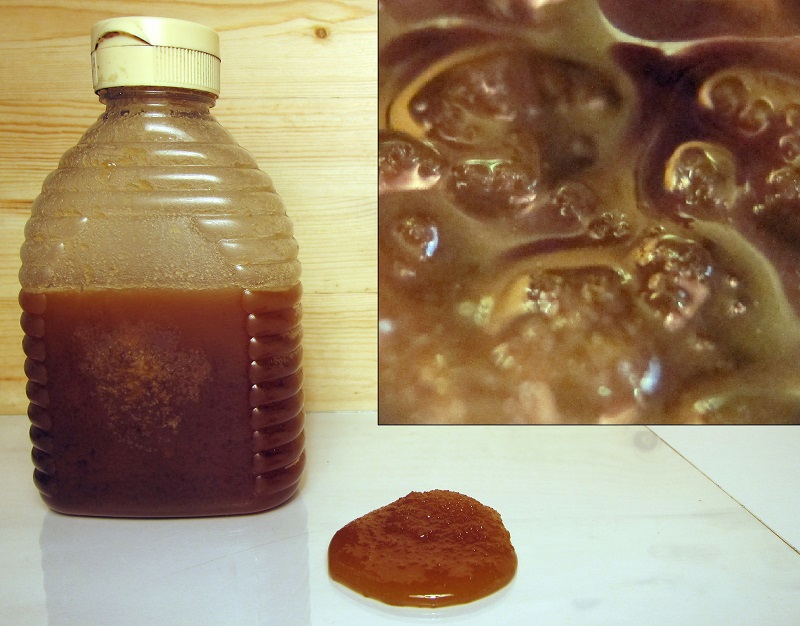

Prithviraj Lamichhane of Ratnanagar Municipality in Chitwan used to extract up to 85 kilograms (kg) of honey annually from a single bee hive 15 years ago. However, in recent years, it has become difficult for him to produce 25 kg of honey per hive.
“I have been doing beekeeping business from 1996. Till 2006, I used to extract 80 to 90 kg of honey from one hive,” he said. He has earned up to Rs. 10,000 from a single hive, after deducting expenses. As honey productivity has been declining, he has been reducing the number of bees in his beehives.
“Five years ago, more than 500 bees used produce honey,” he said. He produces an average of 25 tons of honey annually. He says that despite the benefits of honey, the cost price is also higher than in the past.
It is said that honey production is declining every year due to deforestation, forest encroachment, use of pesticides in crops and impact of climate change. Farmers have been reaching different parts of the country to produce honey as the plants, including Chiuri and Rudilo, are being destroyed in the local forests during the development process. “In the first season, we will move to Dang and Pyuthan for Chiuri, then to Kapilvastu, Chitwan, Bardibas, Sarlahi and other eastern districts for honey production,” said Surendra Manandhar of Ratnanagar, who has been keeping 150 bees. They have been giving Rs. 50 to 100 per round to the community forest for its services.
Beekeepers are also facing problems due to increasing use of pesticides. Megh Bahadur Khatri, who has been beekeeping since 1995, says that the problem of steppe area is the main challenge for beekeepers. “I have 250 bees. The locals will not allow them to move to the grazing area, ”he said.
Lately, bee keeping farmers have been increasing in the district. There are more than 500 farmers. It is estimated that there are 30,000 bees in the district so far. Beekeeping has increased by 30 percent in the last three years, but the productivity of honey has been declining due to the increase in the number of farmers, says Shiva Prasad Poudel, president of the Federation of Beekeeping.
“There are 29,000 hives of Melifera bees in Chitwan. In 2018, the annual production was 55 kg per hive,” he said. “In 2019-20, the production was around 18 kg. 23 kg was produced in 2020-021. Even now, the possibility of obtaining 25 kg is less.” The district had been producing 8,000 metric tons of honey annually till three years ago. According to government figures, the production has dropped to 4,000 metric tons since then.
Dhan Bahadur Thapa, head of the project implementation unit of the Prime Minister’s Agriculture Modernization Project, Chitwan, said that there is a plan to relocate plants including Chiuri and Rudilo and import quality queen bees in collaboration with community forests to increase honey production. “The number of bees is increasing. The phase area is decreasing. Keeping this in mind, we are conducting bee stage management program in consultation with the community forest for planting Chiuri and other plants,” he said. “It has been found that the quality of queen bees is declining. We are preparing to bring queen bees from abroad and give them to the farmers in collaboration with the Bee Development Office for breeding development.”
He informed that programs will be taken forward to increase the capacity of beekeepers. Nepal produced 3,996 metric tons of honey last year, but it is very low in terms of consumption. One thousand metric tons of honey are being imported from abroad annually. Chief of the Beekeeping Development Office, Bhandara, Govinda Prasad Pokharel informed that flowering plants are being planted in collaboration with the community forest to increase the production.
According to him, 30,000 Chiuri saplings are being planted. He said that the number of bee farmers is increasing annually. He said that the farmers have become enthusiastic in beekeeping after the government provided grants and technical assistance through the Prime Minister’s Agriculture Modernization Project’s ‘Bee Zone’ for the past few years. Stakeholders say that honey production can be increased if the pastures are expanded along with the development of quality queen.